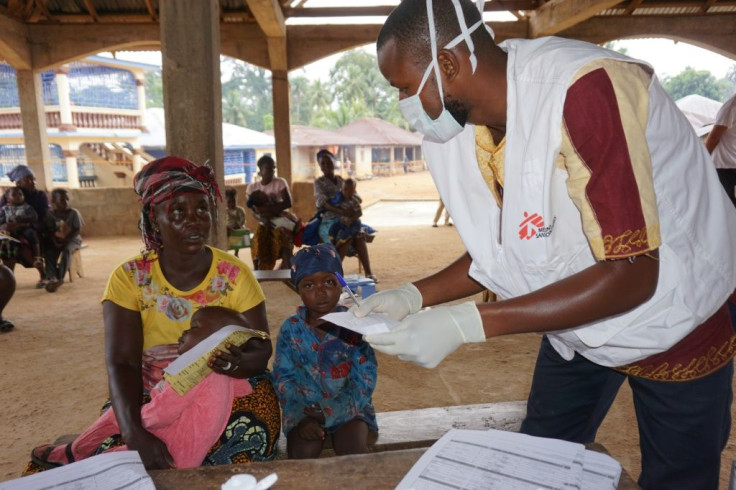'Historic Moment': WHO Recommends Use Of World's First Malaria Vaccine
KEY POINTS
- It is based on the results of an ongoing pilot program in three countries
- Results show the vaccine significantly reduces severe, life-threatening malaria
- It can save "thousands of young lives," WHO Director General says
The World Health Organization (WHO) is officially recommending the widespread use of the RTS,S/AS01 (RTS,S) malaria vaccine in children. The "historic moment" comes after years of research and development for a life-saving vaccine.
Trials carried out in 2015 showed the vaccine was effective in preventing four out of 10 malaria cases and three in 10 severe cases, the BBC reported. However, "there were doubts" about whether the vaccine would actually work in the real world as it requires four doses.
The WHO has now announced it is recommending the "widespread use" of the world's first malaria vaccine among children in sub-Saharan Africa, as well as other locations that are affected by moderate to high P. falciparum malaria transmission.
"Today, WHO is recommending the broad use of the world's first malaria vaccine," WHO Director-General Tedros Adhanom Ghebreyesus said Wednesday. "Today, the RTS,S malaria vaccine – more than 30 years in the making – changes the course of public health history."
The decision to recommend the vaccine, which was developed by GlaxoSmithKline (GSK) and sold under the name "Mosquirix," is based on the results of a malaria vaccine pilot program in Kenya, Ghana and Malawi that has been going on since 2019.
The key findings of the pilot program are that the vaccine is "feasible to deliver," has a "strong safety profile," has no negative impact on other childhood vaccinations, is cost-effective and has a 30% reduction in severe malaria.
Historic moment! WHO recommends wider use of the RTS,S #malaria vaccine in sub-Saharan #Africa.
— WHO African Region (@WHOAFRO) October 6, 2021
The #MalariaVaccine is a game-changer for malaria response & will help protect Africa's children from the deadly disease. https://t.co/lTLzwcW7AI
Despite advances in the fight against the disease, there are still over 200 million cases and 400,000 deaths reported per year globally, with the burden being the "greatest" in Africa.
Malaria continues to be the "primary cause" of illness and death in children in sub-Saharan Africa, the organization said, noting that over 260,000 African children under five years old die from the disease every year. Furthermore, the P. falciparum malaria parasite, which the vaccine targets, is said to be the most prevalent in the continent and the "most deadly malaria parasite globally."
"For centuries, malaria has stalked sub-Saharan Africa, causing immense personal suffering," Matshidiso Moeti, WHO regional director for Africa, said in the news release. "Today's recommendation offers a glimmer of hope for the continent which shoulders the heaviest burden of the disease and we expect many more African children to be protected from malaria and grow into healthy adults."
GSK said it "welcomes and applauds" the recommendation, noting the vaccine to be "the first and only malaria vaccine to have been shown in pivotal long-term clinical trials to significantly reduce malaria in children."
"This long-awaited landmark decision can reinvigorate the fight against malaria in the region at a time when progress on malaria control has stalled," Thomas Breuer, chief global health officer at GSK, said in a statement. "Both real world evidence and clinical trial data show that RTS,S, alongside other malaria prevention measures, has the potential to save hundreds of thousands of lives."
The pilot program will continue in the three countries to have a closer look at the "added value" of the fourth dose, the WHO said. The agency will look at "funding decisions" for a broader rollout.

© Copyright IBTimes 2024. All rights reserved.






















